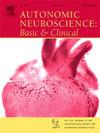Autonomic control of blood pressure in women: The roles of hypertension and aging
IF 3.3
4区 医学
Q2 NEUROSCIENCES
引用次数: 0
Abstract
Hypertension remains a leading cause of cardiovascular morbidity and mortality worldwide, with implications in women's health across the lifespan. Of note, autonomic nervous system imbalances have been linked to the development of hypertension and are present with natural aging and various conditions unique to women (e.g., menopause, hypertensive disorders of pregnancy, polycystic ovary syndrome). As such, this article reviews the critical changes in the sympathetic and parasympathetic nervous systems that occur in women and may contribute to the development of hypertension. Special focus is paid to the regulating pathways across the baroreflex arc, including baroreflex sensitivity, efferent sympathetic outflow, and peripheral sympathetic transduction, at rest and during various physiological stressors. To this point, aging women experience increasing sympathetic outflow, blunted sympathetic transduction, and reduced cardiovagal baroreflex sensitivity, which may be further potentiated by the presence of hypertension. Additionally, this review applies some clinical perspective to the physiological findings in order to identify potential therapeutic pathways. The information gathered in this review has important implications for future research into women's autonomic blood pressure regulation and its impact on the genesis of hypertension.
女性血压的自主控制:高血压和衰老的作用
高血压仍然是全世界心血管疾病发病率和死亡率的主要原因,对妇女一生的健康都有影响。值得注意的是,自主神经系统失衡与高血压的发展有关,并与自然衰老和女性特有的各种疾病(如更年期、妊娠期高血压疾病、多囊卵巢综合征)有关。因此,本文回顾了女性交感和副交感神经系统的关键变化,这些变化可能有助于高血压的发展。特别关注的是在静息和各种生理应激时,横跨压力反射弧的调节途径,包括压力反射敏感性、输出交感神经输出和外周交感神经转导。到目前为止,老年妇女交感神经外流增加,交感神经传导减弱,心血管压力反射敏感性降低,这可能因高血压的存在而进一步增强。此外,本综述将一些临床观点应用于生理学发现,以确定潜在的治疗途径。本综述收集的信息对未来研究女性自主血压调节及其对高血压发生的影响具有重要意义。
本文章由计算机程序翻译,如有差异,请以英文原文为准。
求助全文
约1分钟内获得全文
求助全文
来源期刊
CiteScore
5.80
自引率
7.40%
发文量
83
审稿时长
66 days
期刊介绍:
This is an international journal with broad coverage of all aspects of the autonomic nervous system in man and animals. The main areas of interest include the innervation of blood vessels and viscera, autonomic ganglia, efferent and afferent autonomic pathways, and autonomic nuclei and pathways in the central nervous system.
The Editors will consider papers that deal with any aspect of the autonomic nervous system, including structure, physiology, pharmacology, biochemistry, development, evolution, ageing, behavioural aspects, integrative role and influence on emotional and physical states of the body. Interdisciplinary studies will be encouraged. Studies dealing with human pathology will be also welcome.

 求助内容:
求助内容: 应助结果提醒方式:
应助结果提醒方式:


